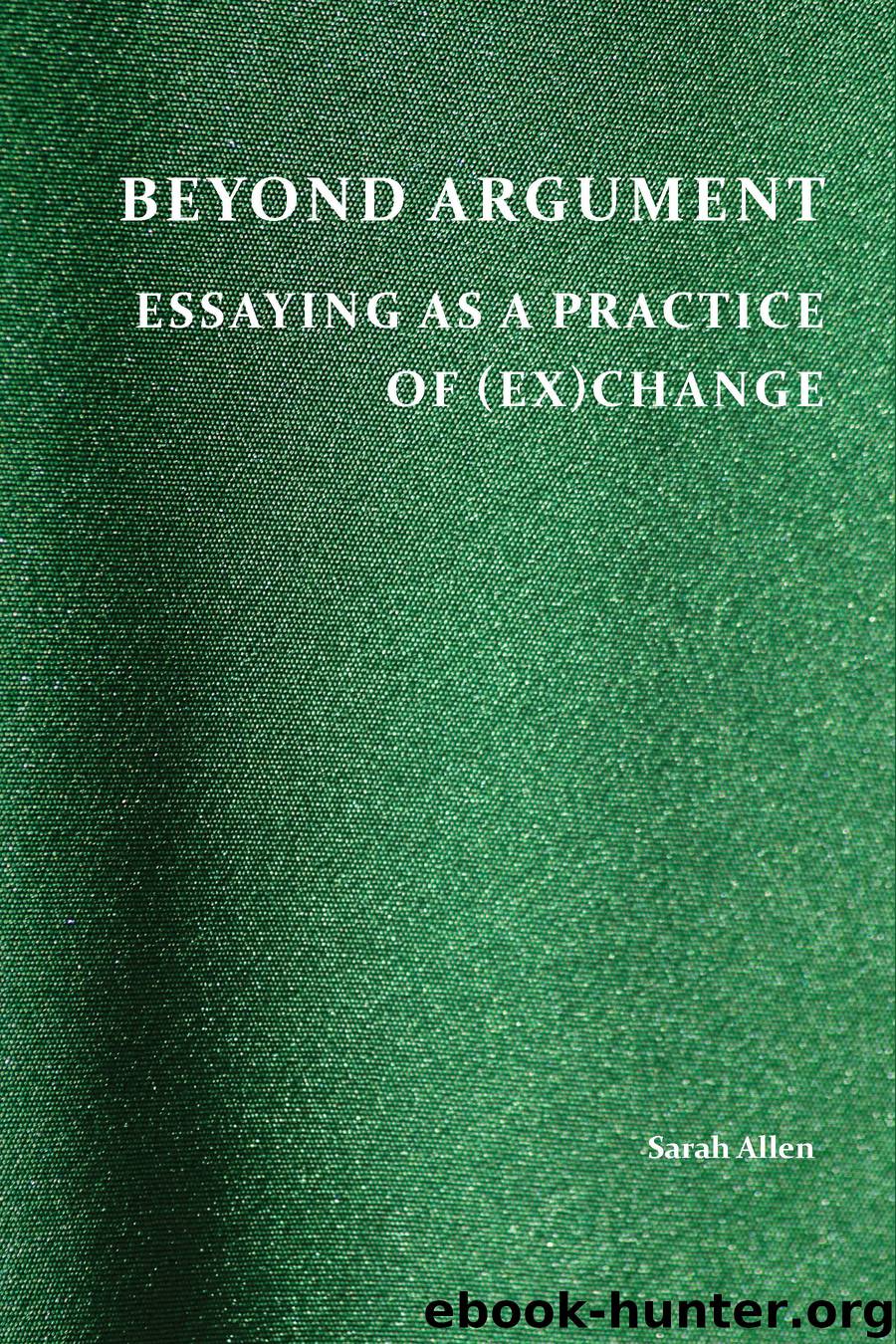Beyond Argument: Essaying as a Practice of (Ex)Change by Sarah Allen

Author:Sarah Allen
Language: eng
Format: epub
Tags: Rhetoric and Composiition, Literacy, Academic Writing, Essays
Publisher: The WAC Clearinghouse and Parlor Press
Published: 2015-11-06T16:00:00+00:00
Chapter 4: Imitation as Meditation
Those who do not want to imitate anything, produce
nothing.
-Salvador Dali
On the first day of my first undergraduate creative writing class, I sat in the back of the room and listened to the whispered anticipation and fear from those who would soon be my writing-competitors, as we waited for our famous poet-teacher to make her first appearance. When she finally walked in, we all stared, rapt as this surprisingly small woman crossed to the front of the classroom and began to pace before the board.
Over the next fifteen weeks, she gave us sentences from her favorite novels to write from; she played opera sung by her favorite soprano and cried while we listened; she talked of inspiration and voice and of the silencing and oppressive acts of the white man and of popular culture; she said that the things we love—music, writing, people—have heartbeats that jive with our own; she quoted James Whitmore saying, “I’m not qualified to teach you, but I can pass on to you what I’ve learned”; and she gave me an “ok” on my in-class writings with no other comments until my final project—a collection of poems—on which she wrote “Fantastic! A” with no other margin or end comments.
There were at least a couple of exceptions in my studies (e.g., a creative nonfiction professor in my MA program who commented at length and at different stages of the writing process on my work), but for the most part, I found that my creative writing courses all went the same way: the teachers told us about the ideas/images/music, etc., that inspired them; they gave us examples of good creative writing; and they commented very little, if at all, on the content of our works. No doubt, there are many other exceptions to the course I’ve just described. After my coursework as a creative writing student, however, I was left wondering if my experience in receiving little in the way of written feedback was a too-common practice in such courses. I have never found a definitive answer, but the question stayed with me, as I went on to become a writing teacher and a writing program administrator.
When I first served as an English department’s composition director and read the instructors’ comments to the personal essays that some assigned in their first-year writing courses, I saw much less commenting on those papers than I did on others—a problem I attributed, at the time, to composition teachers not knowing the genre well enough to make substantial comments. However, even now, when I serve with creative writing professors on creative-writing-focused thesis committees, I find that even their comments on content are broad and sparse and that, at some point, the question of the student’s talent (the presumably innate capacity to write well) comes up.
Again, this is not to suggest that all teachers of creative nonfiction neglect offering extensive feedback to their students’ works. Such an assertion seems ludicrous. Rather, I’m more interested in common practices—in students’ more typical experiences in such courses.
Download
This site does not store any files on its server. We only index and link to content provided by other sites. Please contact the content providers to delete copyright contents if any and email us, we'll remove relevant links or contents immediately.
| Books & Reading | Comparative Literature |
| Criticism & Theory | Genres & Styles |
| Movements & Periods | Reference |
| Regional & Cultural | Women Authors |
4 3 2 1: A Novel by Paul Auster(12391)
The handmaid's tale by Margaret Atwood(7763)
Giovanni's Room by James Baldwin(7346)
Asking the Right Questions: A Guide to Critical Thinking by M. Neil Browne & Stuart M. Keeley(5775)
Big Magic: Creative Living Beyond Fear by Elizabeth Gilbert(5771)
Ego Is the Enemy by Ryan Holiday(5446)
The Body: A Guide for Occupants by Bill Bryson(5096)
On Writing A Memoir of the Craft by Stephen King(4942)
Ken Follett - World without end by Ken Follett(4731)
Adulting by Kelly Williams Brown(4574)
Bluets by Maggie Nelson(4556)
Eat That Frog! by Brian Tracy(4537)
Guilty Pleasures by Laurell K Hamilton(4448)
The Poetry of Pablo Neruda by Pablo Neruda(4106)
Alive: The Story of the Andes Survivors by Piers Paul Read(4031)
White Noise - A Novel by Don DeLillo(4009)
Fingerprints of the Gods by Graham Hancock(4004)
The Book of Joy by Dalai Lama(3986)
The Bookshop by Penelope Fitzgerald(3852)
